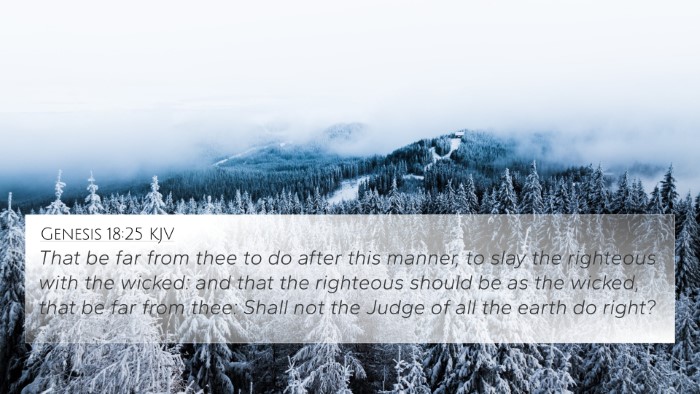Understanding Job 34:17
Job 34:17 states: "Shall even one that hateth right govern? And wilt thou condemn the most just God?" This verse is a significant inquiry into the nature of justice and the righteousness of God, particularly in the midst of trials and suffering.
Meaning and Interpretation
This verse raises an essential question about divine governance and righteousness. Key points from respected public domain commentaries help clarify its significance:
-
Matthew Henry:
Matthew Henry highlights the ethical dilemma posed by Elihu, the speaker in this context. He emphasizes that it is inconceivable for a just God to govern unjustly. Henry points out that if a ruler with a hatred for justice is unfit to govern, then how much more so is an all-good God beyond question.
-
Albert Barnes:
Albert Barnes elaborates on the irreconcilable nature of injustice in the context of divine rule. He suggests that the assertion is fundamentally rhetorical, designed to reinforce the idea that God, as the ultimate overseer, cannot act unjustly. His governance is intrinsically linked to His nature as just and righteous.
-
Adam Clarke:
Adam Clarke focuses on the implications of questioning God's justice. He describes the danger of human presumption in judging God's actions, suggesting that divine wisdom far exceeds human understanding. Clarke warns that those who attempt to assail God's fairness do so at their peril, for God’s justice is ultimately infallible.
Connections to Other Bible Verses
Job 34:17 resonates deeply with several other scriptural passages that address God's nature as just and righteous. Here are notable cross-references:
- Psalm 89:14: "Justice and judgment are the habitation of thy throne: mercy and truth shall go before thy face."
- Isaiah 30:18: "And therefore will the Lord wait, that he may be gracious unto you; and therefore will he be exalted, that he may have mercy upon you: for the Lord is a God of judgment: blessed are all they that wait for him."
- Romans 3:26: "To declare, I say, at this time his righteousness: that he might be just, and the justifier of him which believeth in Jesus."
- Deuteronomy 32:4: "He is the Rock, his work is perfect: for all his ways are judgment: a God of truth and without iniquity, just and right is he."
- Proverbs 21:15: "It is joy to the just to do judgment: but destruction shall be to the workers of iniquity."
- 2 Thessalonians 1:6: "Seeing it is a righteous thing with God to recompense tribulation to them that trouble you;"
- Psalms 11:7: "For the righteous Lord loveth righteousness; his countenance doth behold the upright."
Thematic Bible Verse Connections
Job 34:17 invites deeper themes of righteousness and justice within the biblical narrative. These themes include:
- The Nature of God: God's inherent righteousness serves as a foundation for His governance.
- Divine Justice: The tension between human suffering and divine justice is explored in the narratives of both Job and the Psalms.
- Human Understanding vs. Divine Wisdom: Various verses address the limits of human perspective when confronting divine action.
Implications for Believers
Understanding Job 34:17 encourages believers to:
- Seek Justice: Followers of Christ are called to pursue justice in their lives, reflecting God's nature.
- Trust God’s Sovereignty: Despite circumstances that seem unjust, one should place trust in God's ultimate judgment.
- Engage in Prayer: When suffering, believers should approach God earnestly, knowing He is just and will hear their prayers.
Tools for Bible Cross-Referencing
To better engage with biblical texts and understand the interconnectedness of scripture, consider the following tools:
- Bible Concordance
- Bible Cross-Reference Guide
- Cross-Reference Bible Study Methods
- Comprehensive Bible Cross-Reference Materials
- Bible Chain References
Conclusion
Job 34:17 serves as a profound reminder of God's justice, encouraging believers to reflect on His righteous governance in their lives and the world. Cross-referencing scripture enhances our understanding and allows for a richer engagement with themes of justice and righteousness throughout the Bible.









